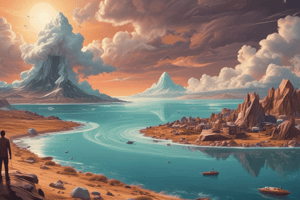Podcast
Questions and Answers
What is the projected decline in coral calcification rates if atmospheric CO₂ concentrations double?
What is the projected decline in coral calcification rates if atmospheric CO₂ concentrations double?
- More than 30% (correct)
- Exactly 30%
- Around 50%
- Less than 10%
Which strategy aims to stabilize the climate system through reducing greenhouse gas emissions and sequestration by forests?
Which strategy aims to stabilize the climate system through reducing greenhouse gas emissions and sequestration by forests?
- Adaptation
- Disaster risk reduction
- Mitigation (correct)
- Raising houses on poles
What effect can warmer ocean waters have on marine species like plankton, mollusks, and shellfish?
What effect can warmer ocean waters have on marine species like plankton, mollusks, and shellfish?
- Decreased reproduction
- Adverse effects (correct)
- Enhanced growth
- No impact
Which consequence of climate change can lead to more frequent and severe wildfires, threatening habitats and causing air pollution?
Which consequence of climate change can lead to more frequent and severe wildfires, threatening habitats and causing air pollution?
Why are extreme weather events like droughts, hurricanes, and floods becoming more intense and unpredictable as global temperatures rise?
Why are extreme weather events like droughts, hurricanes, and floods becoming more intense and unpredictable as global temperatures rise?
What is one of the most immediate impacts of climate change mentioned in the passage?
What is one of the most immediate impacts of climate change mentioned in the passage?
What contributes significantly to climate change by releasing greenhouse gases into the atmosphere?
What contributes significantly to climate change by releasing greenhouse gases into the atmosphere?
What is projected to account for 1.2 to 8 inches of sea level rise by the end of the century?
What is projected to account for 1.2 to 8 inches of sea level rise by the end of the century?
Which factor poses significant risks to coastal communities worldwide, according to the passage?
Which factor poses significant risks to coastal communities worldwide, according to the passage?
What is mentioned as leading to a gradual buildup of greenhouse gases in the atmosphere?
What is mentioned as leading to a gradual buildup of greenhouse gases in the atmosphere?
Study Notes
Climate Change Projection and Impact: An Overview
Climate change is one of the most pressing issues facing our planet today. It refers to long-term alterations in temperatures and typical weather patterns across the globe. Human activities, such as burning fossil fuels, deforestation, and industrial processes, contribute significantly to climate change by releasing greenhouse gases into the atmosphere. This leads to a gradual buildup of greenhouse gases, trapping more heat from the sun, and causing the Earth's average temperature to rise.
The impacts of climate change are multifaceted and far-reaching. One of the most visible and immediate impacts is sea level rise. Since 1870, global sea level has risen by about 7.5 inches, and estimates indicate that it will continue to rise at a greater rate than during the past 50 years. By 2100, global sea level is projected to rise by another 1 to 4 feet, with an uncertainty range of 0.66 to 6.6 feet. Changes in ice sheets are expected to account for 1.2 to 8 inches of sea level rise by the end of this century.
The rising sea levels pose significant risks to coastal communities worldwide. Low-lying areas, including island nations and densely populated coastal cities like New York City and Mumbai, face devastating consequences if we fail to curb emissions. Even if we succeed in achieving climate stabilization, some impacts will still occur due to our past emissions.
Another significant impact of climate change is extreme weather events. As global temperatures climb, widespread shifts in weather systems occur, making events like droughts, hurricanes, and floods more intense and unpredictable. Extreme weather events that may have hit just once in our grandparents’ lifetimes are becoming more common in ours. However, not every place will experience the same effects; climate change may cause severe drought in one region while making floods more likely in another.
Climate change also affects ecosystems and communities directly. For example, warmer ocean waters can adversely affect many marine species, including plankton, mollusks, shellfish, and corals. Coral calcification rates are projected to decline by more than 30% if atmospheric CO₂ concentrations double. Moreover, changes in precipitation patterns and increased evaporation rates can lead to more frequent and severe wildfires, threatening habitats and causing air pollution.
To mitigate the impacts of climate change, various strategies are employed. Mitigation aims to stabilize the climate system through reducing greenhouse gas emissions and sequestration by forests, among other measures. This helps ensure human society and ecosystems can adapt to any future changes. On the other hand, adaptation involves responding and preparing for an unavoidable impact by implementing measures such as disaster risk reduction, raising houses on poles, and converting rice paddies to fish ponds.
In conclusion, climate change projection and impact encompass a wide range of consequences, from sea level rise to ecosystem changes and extreme weather events. Understanding these issues is crucial for developing effective strategies to curb further damage and promote sustainable living for future generations.
Studying That Suits You
Use AI to generate personalized quizzes and flashcards to suit your learning preferences.
Description
Test your knowledge on climate change projection, impact, and strategies for mitigation and adaptation. Explore key concepts such as rising sea levels, extreme weather events, and ecosystem changes due to global warming.




